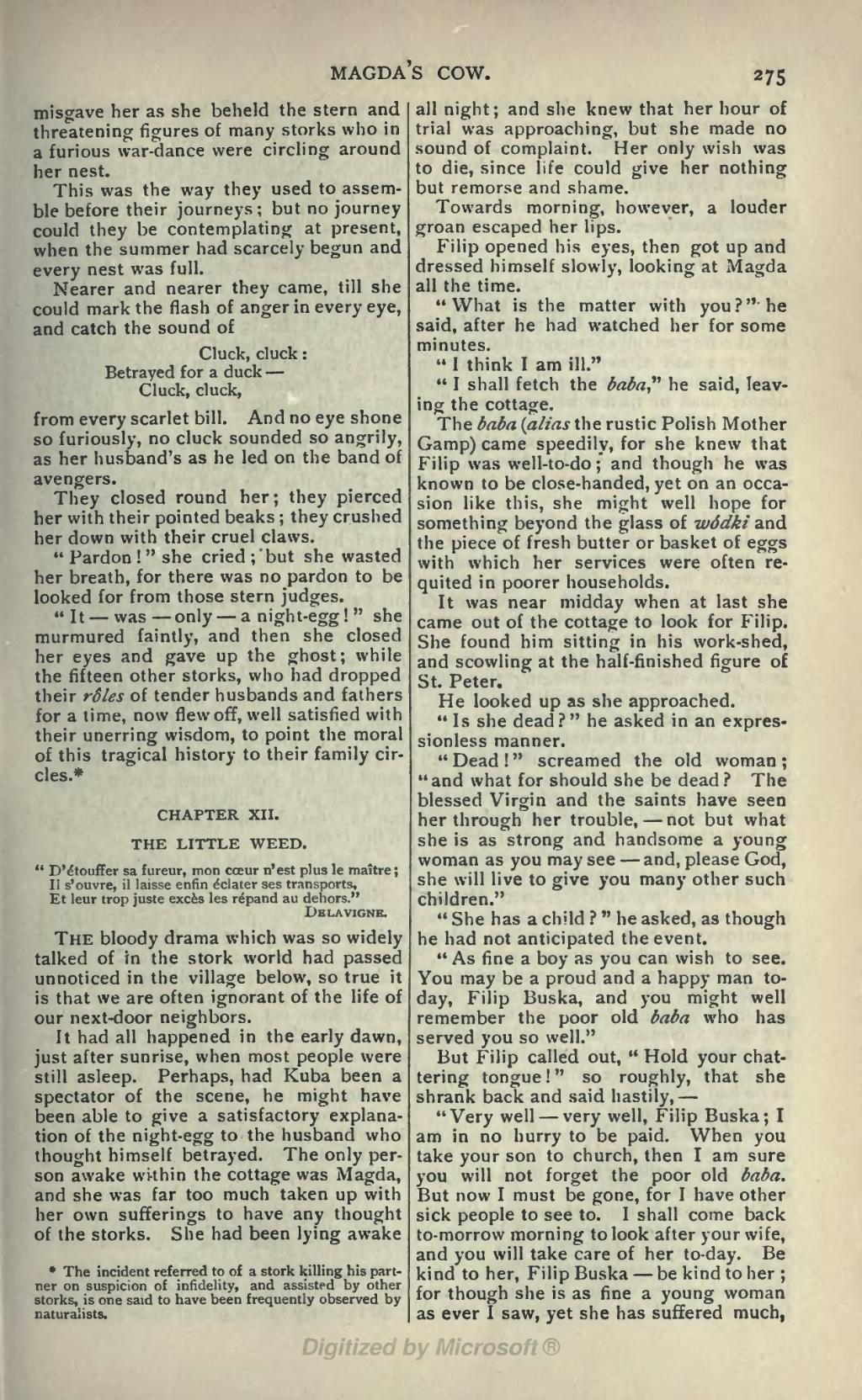misgave her as she beheld the stern and threatening figures of many storks who in a furious war-dance were circling around her nest.
This was the way they used to assemble before their journeys; but no journey could they be contemplating at present, when the summer had scarcely begun and every nest was full.
Nearer and nearer they came, till she could mark the flash of anger in every eye, and catch the sound of
Cluck, cluck:
Betrayed for a duck —
Cluck, cluck,
from every scarlet bill. And no eye shone so furiously, no cluck sounded so angrily, as her husband's as he led on the band of avengers.
They closed round her; they pierced her with their pointed beaks; they crushed her down with their cruel claws.
"Pardon!" she cried; but she wasted her breath, for there was no pardon to be looked for from those stern judges.
"It — was — only — a night-egg!" she murmured faintly, and then she closed her eyes and gave up the ghost; while the fifteen other storks, who had dropped their rôles of tender husbands and fathers for a time, now flew off, well satisfied with their unerring wisdom, to point the moral of this tragical history to their family circles.[1]
CHAPTER XII.
THE LITTLE WEED.
"D'étouffer sa fureur, mon cœur n'est plus le maître;
Il s'ouvre, il laisse enfin éclater ses transports,
Et leur trop juste excès les répand au dehors."
Dhlavigne.
The bloody drama which was so widely talked of in the stork world had passed unnoticed in the village below, so true it is that we are often ignorant of the life of our next-door neighbors.
It had all happened in the early dawn, just after sunrise, when most people were still asleep. Perhaps, had Kuba been a spectator of the scene, he might have been able to give a satisfactory explanation of the night-egg to the husband who thought himself betrayed. The only person awake within the cottage was Magda, and she was far too much taken up with her own sufferings to have any thought of the storks. She had been lying awake all night; and she knew that her hour of trial was approaching, but she made no sound of complaint. Her only wish was to die, since life could give her nothing but remorse and shame.
Towards morning, however, a louder groan escaped her lips.
Filip opened his eyes, then got up and dressed himself slowly, looking at Magda all the time.
"What is the matter with you?" he said, after he had watched her for some minutes.
"I think I am ill."
"I shall fetch the baba" he said, leaving the cottage.
The baba (alias the rustic Polish Mother Gamp) came speedily, for she knew that Filip was well-to-do; and though he was known to be close-handed, yet on an occasion like this, she might well hope for something beyond the glass of wódki and the piece of fresh butter or basket of eggs with which her services were often requited in poorer households.
It was near midday when at last she came out of the cottage to look for Filip. She found him sitting in his work-shed, and scowling at the half-finished figure of St. Peter.
He looked up as she approached.
"Is she dead?" he asked in an expressionless manner.
"Dead!" screamed the old woman; "and what for should she be dead? The blessed Virgin and the saints have seen her through her trouble, — not but what she is as strong and handsome a young woman as you may see — and, please God, she will live to give you many other such children."
"She has a child?" he asked, as though he had not anticipated the event.
"As fine a boy as you can wish to see. You may be a proud and a happy man to-day, Filip Buska, and you might well remember the poor old baba who has served you so well."
But Filip called out, "Hold your chattering tongue!" so roughly, that she shrank back and said hastily, —
"Very well — very well, Filip Buska; I am in no hurry to be paid. When you take your son to church, then I am sure you will not forget the poor old baba. But now I must be gone, for I have other sick people to see to. I shall come back to-morrow morning to look after your wife, and you will take care of her today. Be kind to her, Filip Buska — be kind to her; for though she is as fine a young woman as ever I saw, yet she has suffered much,
- ↑ The incident referred to of a stork killing his partner on suspicion of infidelity, and assisted by other storks, is one said to have been frequently observed by naturalists.
